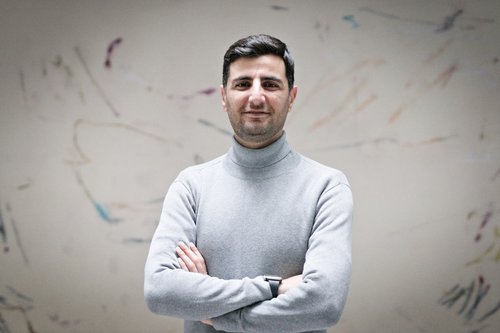Spotlight: Masoud Abdollahi Mobarakeh

Masoud Abdollahi Mobarakeh works as an economist at IHS and has been part of the institute since 2022.
What’s your academic background before joining IHS?
Before joining IHS, I was a Ph.D. candidate in Monetary Economics at Shahid Beheshti University in Tehran and a visiting student at the University of Vienna. During my Ph.D. studies, I taught courses in econometrics, statistics, and microeconomics at the university. Additionally, I worked as a researcher at a research institution in Tehran, focusing on public budgeting and the foreign exchange market.
What’s your role in the research group?
I have been at IHS since October 2022 as a junior researcher in the "Business Cycles, Growth, and Public Finances" group. I work closely with my supervisor, Leopold Soegner, on topics related to time-series econometrics. During this time, we have presented our research at international conferences. Our project is important for advancing econometric methods, especially in analyzing macroeconomic data. This can lead to more accurate results, supporting policymakers in making better-informed decisions.
How about your current research topics and projects?
I am working on time-series econometrics, focusing on “Structural Breaks in Vector Error Correction Models (VECM),” a project funded by the Austrian National Bank (OeNB). My supervisor and I are developing econometric tools to detect structural changes in these models. For example, these tools can help identify shifts in the adjustment or cointegrating vectors. Our research contributes to the theoretical development of econometrics while offering practical applications in both academic and policy-related studies. Once we finalize these tools, we will apply them to real-world data to examine the stability of key economic concepts such as money demand and arbitrage parities discussed in finance literature.
What interests you in your research?
Although my Ph.D. field is Monetary Economics, I have a deep interest in econometrics, especially time-series analysis. My current project involves innovative methods in this area, which keeps me motivated and eager to learn more every day. Isn’t it great when you can learn new things while working? Additionally, I had the opportunity to present our research at two international conferences, which were among the best experiences of my academic career. I am grateful to IHS for providing these valuable opportunities to share our work and engage in insightful discussions.
Working at IHS has been a wonderful experience. Both the research and support teams are professional, friendly, and collaborative. I can’t recall facing any challenges thanks to this supportive environment. I believe IHS is one of the best places for students and researchers seeking an exceptional and inspiring atmosphere.
And what are your plans for the future?
Since my contract will end next year, I am planning to look for new job opportunities. I hope to stay in Austria and continue working in the same field, possibly at another research institution or in a postdoctoral position.
I would like to sincerely thank my supervisor, Leopold Sögner, for creating a supportive and professional working environment, and Robert Kunst, who has been helpful since my first day in Austria. I also wish all my colleagues the very best in their careers.
